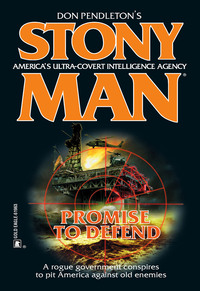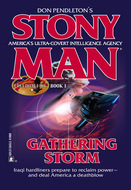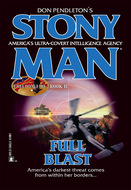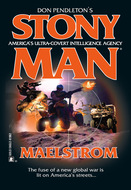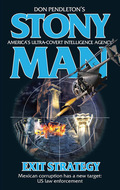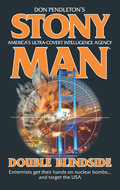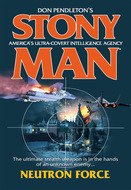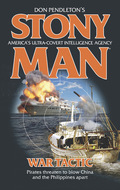Kitap dosya olarak indirilemez ancak uygulamamız üzerinden veya online olarak web sitemizden okunabilir.
Kitabı oku: «Promise To Defend»
ENCIZO LOADED ANOTHER BOLT
Upon seeing his comrade pitch to the ground, the second terrorist dropped into a crouch and fanned his AK-47 over the horizon, while his free hand scrambled for his cell phone. Encizo triggered the crossbow. An instant later the gunner froze as a bolt jutted from his ribs.
The little Cuban checked his watch: 9:07 p.m.
Right on time.
“Two down, Cal,” he whispered into his throat mike. “Your status?”
A moment passed without reply. Then another.
“Cal? Cal?” Encizo whispered again, this time more urgently. The only thing that filled the silence was the plummeting sensation in his stomach. Before he could utter another word, gunshots rang out across the compound.
Other titles in this series:
#13 WARHEAD
#14 DEADLY AGENT
#15 BLOOD DEBT
#16 DEEP ALERT
#17 VORTEX
#18 STINGER
#19 NUCLEAR NIGHTMARE
#20 TERMS OF SURVIVAL
#21 SATAN’S THRUST
#22 SUNFLASH
#23 THE PERISHING GAME
#24 BIRD OF PREY
#25 SKYLANCE
#26 FLASHBACK
#27 ASIAN STORM
#28 BLOOD STAR
#29 EYE OF THE RUBY
#30 VIRTUAL PERIL
#31 NIGHT OF THE JAGUAR
#32 LAW OF LAST RESORT
#33 PUNITIVE MEASURES
#34 REPRISAL
#35 MESSAGE TO AMERICA
#36 STRANGLEHOLD
#37 TRIPLE STRIKE
#38 ENEMY WITHIN
#39 BREACH OF TRUST
#40 BETRAYAL
#41 SILENT INVADER
#42 EDGE OF NIGHT
#43 ZERO HOUR
#44 THIRST FOR POWER
#45 STAR VENTURE
#46 HOSTILE INSTINCT
#47 COMMAND FORCE
#48 CONFLICT IMPERATIVE
#49 DRAGON FIRE
#50 JUDGMENT IN BLOOD
#51 DOOMSDAY DIRECTIVE
#52 TACTICAL RESPONSE
#53 COUNTDOWN TO TERROR
#54 VECTOR THREE
#55 EXTREME MEASURES
#56 STATE OF AGGRESSION
#57 SKY KILLERS
#58 CONDITION HOSTILE
#59 PRELUDE TO WAR
#60 DEFENSIVE ACTION
#61 ROGUE STATE
#62 DEEP RAMPAGE
#63 FREEDOM WATCH
#64 ROOTS OF TERROR
#65 THE THIRD PROTOCOL
#66 AXIS OF CONFLICT
#67 ECHOES OF WAR
#68 OUTBREAK
#69 DAY OF DECISION
#70 RAMROD INTERCEPT
#71 TERMS OF CONTROL
#72 ROLLING THUNDER
#73 COLD OBJECTIVE
#74 THE CHAMELEON FACTOR
#75 SILENT ARSENAL
#76 GATHERING STORM
#77 FULL BLAST
#78 MAELSTROM
Promise to Defend
STONY MAN®
AMERICA’ S ULTRA-COVER INTELLIEGNCE AGENCY
Don Pendleton

To my wife, Robbie, my parents, Dennis and Anita, and my brother, Tony, without whom there’d be no writing career for yours truly. And to O. C. Hayden, who sang like an angel long before he was called to join them.
CONTENTS
CHAPTER ONE
CHAPTER TWO
CHAPTER THREE
CHAPTER FOUR
CHAPTER FIVE
CHAPTER SIX
CHAPTER SEVEN
CHAPTER EIGHT
CHAPTER NINE
CHAPTER TEN
CHAPTER ELEVEN
CHAPTER TWELVE
CHAPTER THIRTEEN
CHAPTER FOURTEEN
CHAPTER FIFTEEN
CHAPTER SIXTEEN
CHAPTER SEVENTEEN
CHAPTER EIGHTEEN
CHAPTER NINETEEN
CHAPTER TWENTY
CHAPTER TWENTY-ONE
CHAPTER TWENTY-TWO
CHAPTER TWENTY-THREE
EPILOGUE
CHAPTER ONE
Washington, D.C.
His face a stony mask, hands clasped behind his back, David Campbell stood at the window of the safehouse’s third-floor library, staring at the nation’s capital. Although he saw the endless rows of stately marble buildings, the throngs of people, the carpet of lights, they barely registered with him. Other things occupied his mind.
The same landscape, but consumed.
Consumed with fire.
Unspeakable carnage.
Squeezing his eyes shut, Campbell tried to banish the images, but found they only returned with a greater vigor. So be it, he thought. He was a man of vision, a man chosen to lead the nation, hell, the world, to greater things. And men of vision suffered. If that was his price, his burden, he’d shoulder it, like the good soldier his father had trained him to be.
Both his father and grandfather had been great men, laying the groundwork for all that would transpire during the next few days. Not that they ever would have envisioned it unfolding as it would, a hellstorm of blood and fire sure to shake the country to its very core. They’d been good men. No, great men. But they never could have envisioned the current circumstances that drove Campbell to do what he was about to do.
There’d be fire, but it’d be a cleansing fire, a rebirth, something that in a dozen years would be celebrated as ushering in a new era for the country. That he had been called upon to marshal such forces and channel them into this pursuit was humbling, indeed. Campbell considered himself a simple man, like his forebears. Not stupid, but simple. A man who saw things in black and white. And he knew, like the Campbell men before him, he’d do the right thing just as they would have done, were they here to see the complexities he faced in his solemn family duty.
A door opened from behind Campbell, and he whirled to greet the visitor. A thick man, his lumpy head shaved clean, entered, stood at attention, waiting for permission to speak.
Jonas Barrins was Campbell’s most trusted confidant. Like Campbell, he was dressed in crisp khakis, a black turtleneck and steel-toed boots. A 9 mm Beretta rode on the man’s left hip, the handgun’s butt jutting forward in a cross-draw position, also just like Campbell.
Other than their mode of dress and their armament, however, the two men differed greatly. Campbell towered six inches over his lieutenant. His body, conditioned by hours of exercise, dwarfed the other man’s slender frame. His steel-gray eyes, wide and intelligent, bore into Barrins’s piggish brown eyes that never seemed to blink.
“At ease, Jonas,” Campbell said, his voice little more than a hoarse whisper.
“Control is waiting.”
“For permission?”
“Yes.”
“Then all, I assume, is ready.”
“Just a word from you.”
“You realize what I’m about to do, don’t you, Jonas? The world I’m about to create? Are the men ready to do this? To take so many lives?”
“We’re ready to follow your lead. To do as you ask.”
Pleased, Campbell gave his comrade a tight smile. In the next instant, the visions—the fire, the screams, the corpses—erupted in his head. He shook them away vigorously. If Barrins caught the behavior, his impenetrable expression gave no indication. Instead he stared at Campbell like a dog awaiting another command.
“You know why I do this, Jonas,” Campbell said. “You of all people understand.”
“Sir?”
“What will happen tomorrow, I mean. I don’t want to do this. But this country, my country, leaves me no choice. I cannot sit by while it destroys itself, chasing third-world savages as a greater danger grows elsewhere. What I will do, I will do for America. The world, really. It can be no other way.”
“It can be no other way,” Barrins echoed. “You can’t second-guess what needs to be done. Or let it trouble you.”
Campbell nodded. “You’re a good soldier and a good friend, Jonas. Please. Sit,” he said, gesturing. “We must rest now, because during the next few days, we’ll be busy doing our sacred work. Our country has grown soft. It’s forgotten its purpose. We aren’t here to spread democracy to the world, but to defend only our own. We worry about the Arabs when we could crush them, turn their region into a smoking hole. We ignore the Communists while they grow stronger.”
Even seated, Barrins kept his back ramrod-straight. “It’s insane,” he agreed. “Your father would agree, if he were still here.”
Campbell’s voice grew icy. “Do not speak of my father. Or his death.”
A nervous tic pulled at the corner of Barrins’s mouth. “I’m sorry. I didn’t mean—”
“What you meant is immaterial. My father is gone. I’m trying to honor his legacy. Only I may speak of him.”
“Of course.”
“They talked of him as though he were crazy, a mad dog to be put down. He tried to warn them, but they wouldn’t listen. He tried to tell them that the Communists remained a threat, despite the end of the cold war.”
“But they wouldn’t listen.”
“No,” Campbell said. “They wouldn’t listen.” Campbell shook his head, felt the anger churn in his gut as he recalled his father’s efforts to sway the government, the President, all to no avail. Swallowing hard, he chased away the memory with a dismissive gesture. “He did his best, and that’s all a man can do. You smoke, Jonas. Please have a cigarette.”
“You don’t mind?”
“Be my guest.”
Campbell watched as the other man produced a cigarette and torched the end with a flame from his lighter. Barrins made a show of turning his head to the left, blowing the smoke from the corner of his mouth so it didn’t stray close to his companion. Campbell suppressed a smile. The little kiss-ass was always so eager to please, so reluctant to make waves with Campbell or his father before him.
“I thought you didn’t like smoke,” Barrins said.
“I can make an exception, for a friend,” Campbell stated. “Especially one so close to the end.”
Barrins raised a fist to his mouth and coughed, expelling tendrils of white smoke from his mouth and nostrils. He raised his eyes at Campbell, even as he tried to clear his throat and lungs. “Sir?” he managed to choke out.
Campbell leaned back in his chair and pinned the other man with his gaze, letting an uncomfortable pause hang between them for several seconds before replying. “Please, Jonas,” he said. “We both know my father’s death was no accident.”
“Of course not, sir. He was assassinated—”
Without thinking Campbell swept an arm across his desktop, clearing it of its contents. The sudden movement caused Barrins to start.
“I told you not to speak of him,” Campbell shouted. “Or his death.”
“Of course,” Barrins said, a tremor audible in his voice.
Campbell watched as Barrins ground out his cigarette and settled his forearm on the armrest, bringing his fingertips closer to the pistol’s butt. Before it all was over, Campbell knew he’d make a play for his gun. It didn’t matter. He had the bastard dead to rights. He could’ve killed him before, but he wanted to drag it out. Toy with the little troll before taking him out.
“You’ve been with us how long now, Jonas? Ten years?”
“Twelve. I’ve been with you twelve years. I joined shortly before—” he caught himself, nearly choking on the words “—I mean, before the change,” he said, referring to the elder Campbell’s death.
Campbell leaned back in his chair, not letting his eyes drift from Barrins’s.
“The President asked that we bring you aboard, as a personal favor to him. From my father’s standpoint, that was good enough. My father trusted the Man. He trusted you. Implicitly, I might add. I trusted you, too, after he died. It was the way I honored his memory.”
“Thank—”
Campbell silenced him with a gesture. “Let me finish. What my father created, what his father created before him, is vital to national security. The Cadre is the only thing that stands between anarchy and the government’s continued operation, should the country suffer a decapitating strike.”
“I understand.”
“I don’t think you do. Many in Washington consider us a cold war relic. They believe I’ve overstepped my bounds, selling arms to raise money and assassinating those I deem a threat to national security. The President wants to pull the plug on the entire operation. Do you know why this operation has succeeded since 1954?”
“Because—”
“Because of loyalty. Unlike other covert programs, we’ve built in a certain level of loyalty—security, if you will—by keeping this a multigenerational project. Most of the men and women working for the Cadre are third or fourth generation. They’ve been raised from their youth, trained in warfare, politics, medicine, agriculture, to step in and take over the country should something happen.
“We’re what the media likes to call a ‘shadow government.’ And we maintained security by keeping to ourselves, never bringing aboard outsiders. We often went into the real world, worked at companies, fought in wars, lived in regular society, but we always came back. This system always worked. We remained a secret to all but a handful of legislators and administration officials.”
Barrins squirmed in his chair. Sweat glistened on his forehead.
“Where are you going with all this?” he blurted, his voice taut.
Campbell smiled. “Where? Where, indeed? As you know, I file reports with the President. I let him know where things are. I don’t tell him about the illegal weapons sales. I don’t tell him when I kill a high-ranking Chinese or North Korean official. Yet he knows these things and it puzzles me. So much so, in fact, that I had to sit back and think. I had to ask myself, ‘Who had the most to gain from betraying me?’”
Barrins’s piggish eyes began darting right, left, looking everywhere but at Campbell.
“After that, I took it a step further. My father was assassinated, I believe, by the very government we serve. And if that same government infiltrated the Cadre with a rogue agent, what might that person do. Kill me, perhaps?”
“Surely you don’t think…” Barrins protested.
“I don’t think,” Campbell said. “I know.”
He mashed a button under his desk with a boot-clad toe.
The door behind Barrins opened and a man entered the room.
His hand dwarfed the SIG-Sauer P220 he carried. Barrins clawed for his weapon. He emitted a small whimper as he realized he’d never complete the move.
The bigger man’s handgun cracked twice, the bullets drilling through the seat’s backrest and into Barrins. His body seized up and he gagged. Blood frothed at his lips as they worked soundlessly.
“You see, Barrins,” Campbell continued, as though the words still registered with the dying man. “I looked at two things, ability and motive. You had access to the most critical intelligence. I fed you some of it as a test. The rest you stole with good, old-fashioned tradecraft, particularly hacking into our most secure servers and drilling your subordinates for information. Your motive? Well, you’re a kiss-ass, a weak-willed kiss-ass and you couldn’t help but please the President. I’m sure money changed hands, too. But I think that was secondary.”
Barrins shifted around in his chair. Struggling fingers grasped his Beretta’s grip. The SIG-Sauer cracked once more and a bullet cored into Barrins, shattering his spine before exiting his stomach and lodging itself into Campbell’s armored desk.
Campbell shook his head, made a clucking noise with his tongue. “Poor, misguided bastard,” he said. “He just didn’t understand who he was fucking with.” With a gesture, he beckoned the shooter to step from the shadows and enter the library. “Ellis?”
The big man took a couple more steps into the room, holstering the side arm as he did.
“Sir?”
“Let the others know. This betrayal changes nothing. Nothing. Soon it will be a different world. I don’t care what it takes to create it, we will have a different world. Let everyone know that.”
“Gladly,” Ellis White said.
Mexico
CONCLUDING HIS PRAYERS, Hassan Salih stuffed his weathered copy of the Koran into his pocket, then checked his wristwatch. A smile tugged at the corners of his lips. It was time.
He rose to his feet. Dusting off the seat of his pants with his right hand, he hefted his canvas duffel bag and slung its carrying strap over his shoulder. After spending hours crammed inside the sweltering tunnel, breathing the dust-laden air as they sat in stony silence, the sudden burst of movement grabbed the attention of the others. They all turned to regard him.
He met their expectant gazes and said, “Come, brothers. It is time to perform God’s work.”
Still silent, the others stood, shouldering their gear bags as they rose. Turning, Salih started down the narrow passage, which was carved into the desert floor. From what he’d been told, the tunnel had been dug by a Mexican drug cartel and used for transporting narcotics into America and cash south of the U.S. border.
This night it was to be used to smuggle something much deadlier. He and his fellow warriors had come to the United States looking to draw blood from the Americans. As with many of the men accompanying him, Salih was young, just twenty-six years old. He’d graduated from university in Riyadh four years earlier, armed with a degree in Islamic studies but sentenced to a life of state-sponsored welfare. Humiliation and rage seemed to be his most constant companions as he’d searched for meaningful work, but to no avail. With nothing but time on his hands, he’d spent his days in religious schools, studying the Koran, deepening his faith, speaking with others who shared his anger and frustration over the circumstances he and his brothers faced.
Part of the blame, he knew, lay with his own country’s government. The royal family was as addicted to Western money as America was to his homeland’s oil. The Saudi rulers encouraged immigrants—men and women from Pakistan and other Muslim nations—to take jobs that rightfully should go to the Saudis.
But it was America that propped up the royal family, supporting it with weapons and money, even as the Saudi people continued sinking into an ever-deeper quagmire of humiliation and rage. Meanwhile, the royal family with its palaces, private jets and portfolios of American stocks ignored the rage simmering all around it. It continued to do business with a country that sold weapons to the Israelis, which in turn, used them to hunt and murder other Muslims in the West Bank and Gaza Strip.
Fortunately a few true believers within the government still understood the plight of the Arab people. They had been more than happy to give him the money he needed to travel to training camps in Afghanistan where he’d learned to shoot and fight. God had blessed him, placing him in Afghanistan as the United States had brought in its damnable weapons to overthrow the Taliban. Salih had watched several of his friends die under the onslaught of machine-gun fire and so-called daisy cutter bombs unleashed from America’s flying warships. Though a piece of him died each time a comrade fell, he’d held on to the anger, using it to fuel his battle against the Americans.
When it became apparent that Afghanistan was largely a lost cause, he’d traveled to Waziristan, the territory along the Afghanistan-Pakistan border. From there he’d traveled to Iraq, only too eager to engage the enemy again. In Afghanistan, he’d found himself in the unfortunate position of battling against warriors from the Northern Alliance. But in Iraq, he’d been blessed to engage the real enemy, the Americans, face-to-face. Using a rocket-propelled grenade, his aim guided by God, he’d downed a Black Hawk helicopter, killing five American soldiers. His rejoicing had come to an abrupt end when, a few days later, he’d taken a bullet in the chest, forcing him to be smuggled out of the country and into a Syrian hospital for treatment. After that, he’d heard that his name and face had become known to the Americans, forcing him to abandon the Iraqi conflict to avoid arrest. It wasn’t that he feared death. Quite the contrary; he feared being taken alive, where he could potentially be co-opted into helping the Americans and potentially destroying all he held dear. Unwilling to let that happen, he’d moved to Paris.
During his time in Europe, he’d prayed many times a day for the chance to exact revenge on the Americans in their own land. During his time in France, he’d been approached by recruiters from the Arm of God, a group of like-minded warriors ready to exact revenge on the West for its transgressions in the Middle East. Once he’d agreed to join, things had moved quickly for him and the other recruits. There’d been more training in Somalia, not just weapons and assassination techniques, but lessons on American culture and speech training to nearly eliminate what Westerners would consider an accent.
Since he’d joined the group, he’d found a seemingly endless stream of money and weapons. For that, he considered himself truly fortunate, a humble warrior handed a once-in-a-lifetime chance.
He would repay God for the opportunity by killing as many Americans as possible and facing his own death with pride, courage.
He walked the next half mile or so keenly aware of the excitement buzzing in his stomach as he anticipated the upcoming events. As he moved, he cast the flashlight’s white beam over the narrow passage. He heard the steady, plodding footsteps of his fellow warriors and the occasional frenzied scratching of a rodent scurrying away. The light hit a wall, indicating the tunnel’s end. To his left, he saw a ladder that led into a small farmhouse on the American side of the border.
Reaching the ladder, he extinguished the light, shoved it into the back pocket of his blue jeans and grabbed for the first rung.
At the top of the ladder was a trapdoor fitted with two locks. When the top of his head came within a few inches of the door, he reached inside the breast pocket of his shirt, felt around until he located a pair of keys. Slipping one key into the lock farthest from him, he gave it a twist, but left it in the keyhole. Following the same procedure with the second lock, he felt his breath hang in his throat as he turned the key. According to his contact in Mexico, a biker named Ed Stephens, the door was fitted with an explosive charge set to detonate if the locks weren’t opened in a certain order and the keys left in place. Grasping the handle, he gingerly pushed the door open and breathed a sigh of relief when it came free without incident.
Within minutes he had exited the tunnel. His comrade, Jamal Hejazi, a short man with unkempt hair and narrow shoulders, stood at his side.
“We should look around,” Salih said, “while the others unload the equipment.”
Hejazi nodded.
Filling his hands with a Glock 17 and his flashlight, Hejazi a few steps behind, Salih exited the room and crept down the hallway. A sharp noise from outside the house brought him to a halt. He shot a questioning glance to Hejazi, who nodded in reply. Salih extinguished the flashlight beam, slipped into a room to his left and peered through a dust-laden window. A dark, bulky vehicle stood near the front porch. He couldn’t identify the brand of vehicle, but he immediately recognized the logo on the driver’s-side door: U.S. Border Patrol.
His grip tightening on the pistol, he whirled toward Hejazi, but found him gone. Salih swore under his breath and trailed after his friend. As he stepped into the hallway, he heard the front door come open, squeaking on rusted hinges. Flashlights immediately pierced the darkness, sweeping over the walls. He caught Hejazi’s shadow up ahead, flattened against a wall, his handgun held next to his ear, muzzle pointing skyward.
Hejazi gave him a look and Salih shook his head, held up his hand. Edging along the wall, he tried to bridge the gap between the two men, even as a pair of shadows overtook a nearby wall.
“U.S. Border Patrol,” a female voice said. “We saw the vehicles out front. I want you to step out here and show yourselves. Now.”
Salih felt fear and anger roiling within. Their contact had told them that he’d leave a pair of vans at the house for transportation. The Border Patrol agents had spotted them and decided to investigate. Had they called for backup? And, if so, when would it arrive? The notion that they’d come this far only to fail was intolerable to Salih. That a woman—a woman—had interfered and was shouting orders only increased the sting. They needed to act, to go down fighting, if necessary. But go down as men.
Apparently, Hejazi felt the same way.
The small man rounded the corner, his weapon rising as the flashlight beams illuminated his chest and face. The officers, their voices taut with fear, shouted for him to halt his advance. But he didn’t. The pistol cracked twice and Salih saw one of the shadows fall. A microsecond later bullets hammered into Hejazi’s chest and stomach, launching him into a backward march that ended when he collided with a wall. Unable to take another step, his limbs became rubbery and he crumpled to the floor.
Salih, Glock held high, his heartbeat thundering in his ears, approached his old friend.
“Officer down, damn it,” he heard the Border Patrol agent saying from the other room. The agent’s shadow loomed larger as he approached Hejazi’s corpse. “Where the hell’s my backup?”
Despite the vengeful rage boiling within, Salih forced himself to think clearly. They needed to get out of here before more agents arrived and they ended up making a last stand here in the desert.
The officer came into view, his handgun leveled in front of him. His eyes widened as he saw Salih. The muzzle tracked toward Salih, but he already had the American in his sights. The Glock’s report echoed throughout the corridor as a pair of 9 mm slugs caught the Border Patrol agent’s head, killing him instantly.
By the time the American folded to the ground, Salih’s fellow warriors had flocked to his side or gathered around Hejazi, checking in vain for signs of life. He didn’t wait for them to pronounce what he already knew in his heart.
“Take his body to the van,” Salih ordered. “We have no time to waste. For today, we must go, hide. But tomorrow the Americans will pay for his death and many others a thousand times over.”
Ücretsiz ön izlemeyi tamamladınız.
